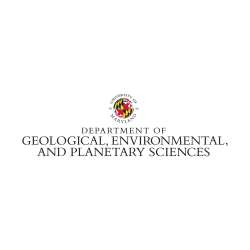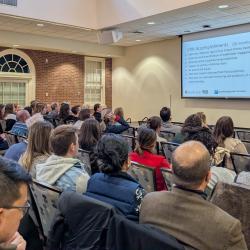Deep Time, Deep Foundations: Ann Wylie’s Years at Maryland Leave a Lasting Mark
Since Ann Wylie’s arrival at the University of Maryland in 1972 as an assistant professor, she has seen a lot of changes. And she has been instrumental in helping many of the changes take place.
A nationally recognized mineralogist and economic geologist, Wylie has never been one to take the prescribed route. She left her home in Midland, Texas at a time, she says, when no one left Texas, to go to Wellesley College and later Columbia University. Wylie became the first woman faculty member in Maryland’s Department of Agronomy, and was also the first female faculty member in the Department of Geology when it was created in 1973.
After more than two decades on the faculty at Maryland, Wylie began to take on leadership positions—most recently senior vice president and provost—and helped propel the university into the ranks of top research and teaching institutions. She was named the university’s Outstanding Woman of the Year in 2012, and last year, she became the first geology faculty member to receive the President’s Medal.
After 42 years at the University of Maryland, Wylie retired last fall. She recently talked with Odyssey about her career, how she’s seen the university change and what she hopes for the university’s future.
Is geology something you always planned to study?
My grandfather was the chief geologist for Philips Petroleum. I went to college as a mathematics major, but I lost interest. I took a course in geology, in honor of my grandfather, and I found it extraordinarily interesting, so I switched my major to geology.
Was your career goal always to become a professor?
I always wanted to teach, but I thought I would teach high school students. When I was getting my Ph.D. at Columbia University, I chose laboratory work over field study and discovered that I loved research as well as teaching. When I graduated, my husband and I moved to Washington, D.C., because I thought I could get a job at the Bureau of Mines or the Geological Survey. I didn’t even get an interview at the Geological Survey! But the University of Maryland hired me, and I never looked back. As a professor, I always felt like I was giving students a gift. Most young people have no idea about the world that they live in, so when you begin to point things out, you raise their awareness of the world and enrich their lives.
How have things changed for women in science since you began your career?
It’s night and day. I never experienced what many women in my generation did—having to take a job well beneath them—but women in the sciences were just not taken seriously in the 1970s. Many were relegated to being lab technicians. I’m proud to see an abundance of women in geology today, and I believe they have equal opportunities for jobs.
What drew you to administration?
I love the University of Maryland. I always kept myself involved in the life of the university. As a female professor in the sciences, I served on a lot of committees, and I liked that. Except for a two-year period when I was the associate dean for research of the Graduate School, I spent 27 years as a faculty member before I entered higher education administration, first as associate dean, then as associate provost, assistant president and chief of staff, vice president for administrative affairs, and senior vice president and provost. I immediately took hold of the jobs. I had been at the university so long and had seen so much of the university that I really understood how it worked from the bottom to the top, and the issues that were important to faculty, staff and students.
You’ve been involved in a lot of changes here. What accomplishment are you the most proud of?
Of the things I think I played a small role in, I’m the most proud of the transformation of the University of Maryland to a first-tier institution. When I was named associate provost in 2000, I took on issues I thought were standing in the way of our university being excellent. For instance, I worked with the University Senate to begin to change some of our academic standards to improve our students’ academic achievements and graduation rates. We didn’t just wait for good students to come, we made sure we were accepting and graduating the best and brightest students. One thing I’ve seen over and over is that people rise to the expectations that are set for them. Achieving and maintaining excellence is an ongoing process that has been extraordinarily rewarding for me.
What advice do you have for geology majors?
Geology is a marvelous major. This field provides excellent training as a general problem solver. The skills you will learn in how to formulate hypotheses and manage and analyze data can be applied to any problem in your life. Geology also gives you a perspective on human life. Humans have only been around for the blink of an eye, whereas Earth has been around for a long time, and it’s always changing. As a result, geologists are gifted with the sense of deep time.
What’s next for you?
I’ve almost finished writing a book on the history of the Catoctin Mountains, which includes trail guides. I spend time hiking and playing golf. I am writing review papers, and I serve on the scientific advisory board of the National Stone, Sand and Gravel Association. I also continue to work with the geology department to help engage alumni with their alma mater.
Writer: Ellen Ternes
This article was published in the Summer 2015 issue of Odyssey magazine. To read other stories from that issue, please visit go.umd.edu/odyssey.







